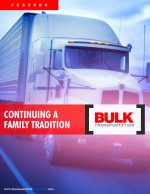Continuing a Family Tradition
Second, third generations involved in Bulk Transportation’s evolution

When a 20-something Geoff Cross left his United Kingdom home and headed west across the Atlantic, he probably didn’t imagine his working life would continue into his 80s into the United States.
Cross arrived on the east coast of North America in the 1950s and worked his way across the continent with his wife, Alma, in a perpetual search for the dream professional situation. They parked cars, washed dishes, canned lobsters and drove trucks on their travels before ultimately reaching California, finding a partner and founding a company – Brown and Cross Trucking – to haul clay.
The small company began hauling rock, sand and gravel in 1961, and, within five years, Cross was the sole owner of the entity – renamed as Bulk Transportation – whose assets included one power unit and five dry bulk trailers. Bulk celebrated its 50th anniversary in 2008 at the company headquarters in Walnut, Calif., and “Founders Day†is noted with a similar party every year.
And 56 years after the improbable start, Cross and his family are still making an impact.
“Mr. Cross is now 85 years old and still going strong,†said Dwight Anderson, now vice president and director of logistics/marketing for the company Cross created. “Geoff appointed Brett Richardson as president and CEO and Jeff Machado as vice president of operations in March of 2014 to manage the business, however Geoff does come into the office most days and does attend all company meetings. He’s still very involved.â€
Cross’s daughter, Susan, handles the company’s front desk, telephone and internal communications as corporate secretary; while his grandson, Geoff, joined the safety department after graduating from the University of Montana Western and has handled both driver training and dispatch responsibilities.
The business has been a privately-owned family operation since its beginnings, which, Anderson said, allows for more nimble reactions and decision-making than the typical corporate structure.
“Working in a family business allows quick decisions on company matters,†he said.
“No need to go thru several layers of management.â€
Such a shift was evident in the late 1960s, when the company expanded to haul grain, feed, fertilizer and dry goods that required the use of pneumatic trailers. Tank trucks soon became the mover of choice for large volumes of hazardous products like acids, chlorine and caustics, and company acquisitions paved the way for an increased inventory of tractors and tank trailers.
Additional footprint came when services were initially increased to existing customers, before new territories were added. By the mid-1970s, trailers were added to haul propane and ammonia, then a company whose specialization was transportation of animal fats was purchased.
Feed and grain hauling ultimately became railroad-centric services, so with the onset of the 1990s came another shift in business focus – this time one that steered away from dry bulk operations and toward liquids and chemicals like caustic soda, sulfuric acid and hydrochloric acid that are moved for mining companies and industrial/specialty chemical processors.
The company’s workforce stands at 225 employees, which represents a significant uptick in staff thanks to internal expansions and acquisition of new business. It was able to withstand the economic downturn thanks to a diversified client base, though most of the business still comes from chemical companies.
The corporate office and an operations terminal remain in Walnut, Calif., and the company also has California-based terminal facilities in Long Beach, Adelanto and Stockton.
Its presence stretches northward into Portland, Ore. and Tacoma, Wash. and east into Las Vegas. Other facilities are located in Henderson, Nev., Buckeye, Chandler and Safford, Ariz., Hurley, N.M. and both Channelview and El Paso, Texas.It owns 130 tractors and 460 trailers and has 60 owner-operator vehicles that run in all 48 contiguous U.S. states, along with Canada and Mexico.
“In this era of limited drivers and assets we continue to evaluate what we do in each terminal location with the customer base in that area,†Anderson said.
Additionally, Bulk’s vehicle maintenance shop in Walnut is certified to do warranty work on Kenworth trucks, and an in-house tank wash rack can clean as many as 50 trailers daily. About 60 percent of the company fleet is cleaned in Walnut.
“Industry leading shippers want safety, service andcost, and they want a partnership so they know when they have shipments we are there for them,†Anderson said. “We offer and sell reliable service. In the driver shortage and asset shortage world we work in today, this is a plus for our customers. We are in several states, and our customers appreciate the fact that we can service theirbusinesses in several different locales. Customers like on-time deliveries and proper billing, and we provide both.â€
Going forward, a greater thinning out of the industry is expected, and the company will continue to contend with enhanced government oversight as well.
“We see continued consolidation of the tank truck Industry,†Anderson said,“and along with this comes profitable growth in the areas where we are located. There are many new rules and regulations coming out of our government, such as the (hours of service) rules and mandated electronic onboard devices to monitor driver hours. We are living with the (California Air Resources Board) rules.â€
AT A GLANCE
WHO: Bulk Transportation
WHAT: A tank-truck carrier and intermodal service provider
WHERE: Headquarters in Walnut, Calif.; facilities elsewhere in California, as well as Nevada, Oregon, Arizona, Washington, New Mexico and Texas
WEBSITE: www.Bulk-DTI.com








